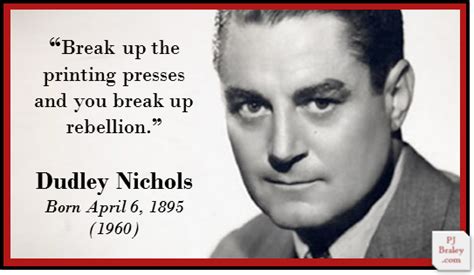Цитата Дадли Николса
Иисус из Назарета мог просто выразить Себя в нравственных заповедях; но, как великий поэт, Он избрал форму притчи, чудесных рассказов, которые развлекали и облекали нравственную заповедь в вечную форму. Недостаточно уловить ум человека, вы должны также уловить способности его ума к воображению.
Связанные цитаты
Иисус рассказывал притчи. Когда он хотел сказать что-то действительно глубокое о Боге, он переходил к притчам. Я не нахожу ничего удивительного в том, что, когда раннее христианство хотело сказать что-то глубокое об Иисусе, они также прибегали к притчам. Это не значит, что все это притча. Когда говорится, что Иисус был в Назарете, я не думаю, что это притча, я думаю, что Иисус был в Назарете. Когда речь идет об Иисусе, идущем по воде, я не думаю, что это вообще имеет значение, я думаю, что смысл в том, что церковь без Иисуса тонет.
В каждом из нас господствуют две силы, одна мужская, другая женская: и в мужском мозгу мужчина преобладает над женщиной, и в женском мозгу женщина преобладает над мужчиной... женская часть мозга должна иметь эффект; и женщина также должна иметь общение с мужчиной в ней. Возможно, именно это имел в виду Кольридж, когда говорил, что великий ум андрогинен. Когда происходит это слияние, ум полностью оплодотворяется и использует все свои способности.
То, что я замечаю, как историк, читающий рассказы о так называемых чудесах природы, о хождении по воде или о чудесном улове рыбы, делается специально для посвященных, для учеников. Обычно исцеления и экзорцизмы совершаются для людей как бы по дороге. Иисус не идет по воде, чтобы спасти рыбацкую флотилию из Капернаума, Он идет по воде, чтобы спасти учеников. Это притча, болван, это притча, разве ты не понимаешь? Если руководство церкви взлетит в лодке без Иисуса, она утонет, никуда не денется.
Большой художественный талант в любом направлении... вряд ли присущ мужчине. Оно приходит и уходит; им часто владеют только в течение короткого периода его жизни; это почти никогда не окрашивает его характер в целом и не имеет ничего общего с моральным и интеллектуальным содержанием ума и души. Многие великие художники, может быть, даже самые великие художники, действительно были бедняками, знать которых означало презирать.
Нравственные способности обычно считаются, и справедливо, более ценными, чем интеллектуальные способности. Но мы всегда должны иметь в виду, что деятельность ума по живому воспроизведению прошлых впечатлений является одной из основных, хотя и второстепенных основ совести. Этот факт дает сильнейший аргумент в пользу воспитания и стимулирования всеми возможными способами интеллектуальных способностей каждого человека.
Забота о самом человеке и его судьбе всегда должна составлять главный интерес всех технических усилий, забота о великих нерешенных проблемах организации труда и распределения благ, чтобы творения нашего ума были благом, а не проклятие человечества. Никогда не забывайте об этом среди ваших диаграмм и уравнений.
Проведя время с «грешниками», а также с предполагаемыми святыми, я догадываюсь, почему Иисус проводил так много времени с первой группой: я думаю, что он предпочитал их компанию. Поскольку грешники были честны в отношении самих себя и не притворялись, Иисус мог иметь с ними дело. Напротив, святые зазнавались, осуждали его и стремились поймать его в нравственную ловушку. В конце концов, именно святые, а не грешники, арестовали Иисуса.
Неверие не состоит в том, чтобы верить или не верить; оно состоит в том, чтобы заявить, что верит в то, во что он не верит. Невозможно подсчитать моральный вред, если можно так выразиться, который умственная ложь произвела в обществе. Когда человек настолько развратил и развратил целомудрие своего ума, что подчинил свою профессиональную веру вещам, в которые не верит, он приготовился к совершению любого другого преступления.
Нам с тобой нужно научиться забывать наши различия. Когда мы собираемся вместе, мы не собираемся вместе как баптисты или методисты. Вы не попадаете в ад, потому что вы баптист, и вы не попадаете в ад, потому что вы методист... Вы не попадаете в ад, потому что вы демократ или республиканец. Ты не попадешь в ад, потому что ты масон или лось. И ты точно не попадешь в ад, потому что ты американец; потому что если бы ты был американцем, ты бы ни за что не заразился. Ты поймаешь ад, потому что ты черный. Вы попадаете в ад, все мы попадаем в ад по одной и той же причине.



































